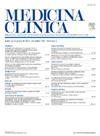Effectiveness and immunogenicity of SARS-CoV-2 booster vaccine in immunosuppressed systemic autoimmune disease patients: A prospective study
IF 2.6
4区 医学
Q1 MEDICINE, GENERAL & INTERNAL
引用次数: 0
Abstract
Introduction and objectives
Patients with systemic autoimmune rheumatic disease (SARD) are a vulnerable population for severe COVID-19 and worse response to vaccination, prompting the need of a booster vaccine. Data regarding its response is limited and inconsistent. The aim of this study was to assess the effectiveness and immunogenicity of the third dose of the SARS-CoV-2 vaccine in immunosuppressed SARD patients.
Materials and methods
We conducted a prospective study in immunosuppressed SARD Portuguese patients, who received a SARS-CoV-2 booster vaccine, from October 2021 to August 2022. We evaluated COVID-19 incidence in the following 6 months, as well as vaccine immunogenicity through anti-Spike IgG titers and T-cell reactivity to the Spike protein.
Results
We included 131 patients with a mean age of 54.9 ± 12.2 years. Almost 40% (n = 52) developed COVID-19 within 6 months after the booster, but 51 (98.1%) were mild infections. Median post-booster antibody levels and antibody variation were 9540.7 (14,724) and 8937.9 (11,561.3) AU/mL, respectively, and 73.3% (n = 96) of the patients showed post-booster T-cell reactivity. Antibody variation was significantly lower in the COVID group (p = 0.015). Although post-booster antibody levels and T-cell reactivity were statistically significantly lower in the patients under biologic DMARD, there was not a significant increase in COVID-19 incidence.
Conclusions
This study shows that a booster vaccine elicits strong immunogenicity and reduces COVID-19 severity, highlighting its importance in immunosuppressed SARD patients. Larger and more homogeneous cohorts are needed to guide periodic booster administration in this susceptible population.
引言和目的全身性自身免疫性风湿病(SARD)患者是 COVID-19 的易感人群,对疫苗接种的反应较差,因此需要加强接种。有关其反应的数据有限且不一致。本研究的目的是评估免疫抑制的 SARD 患者接种第三剂 SARS-CoV-2 疫苗的有效性和免疫原性。材料和方法我们在 2021 年 10 月至 2022 年 8 月期间对免疫抑制的 SARD 葡萄牙患者进行了一项前瞻性研究,这些患者接种了 SARS-CoV-2 加强型疫苗。我们通过抗斯派克 IgG 滴度和 T 细胞对斯派克蛋白的反应评估了随后 6 个月中 COVID-19 的发病率以及疫苗的免疫原性。近 40% 的患者(n = 52)在加强接种后 6 个月内出现 COVID-19,但其中 51 例(98.1%)为轻度感染。加强后抗体水平和抗体变异的中位数分别为 9540.7 (14,724) AU/mL 和 8937.9 (11,561.3) AU/mL,73.3%(n = 96)的患者在加强后出现 T 细胞反应。COVID 组的抗体变异率明显较低(p = 0.015)。结论这项研究表明,加强型疫苗具有很强的免疫原性,并能降低 COVID-19 的严重程度,突出了其在免疫抑制的 SARD 患者中的重要性。需要更大规模和更均匀的队列来指导这一易感人群定期接种强化疫苗。
本文章由计算机程序翻译,如有差异,请以英文原文为准。
求助全文
约1分钟内获得全文
求助全文
来源期刊

Medicina Clinica
医学-医学:内科
CiteScore
3.10
自引率
5.10%
发文量
295
审稿时长
22 days
期刊介绍:
Medicina Clínica, fundada en 1943, es una publicación quincenal dedicada a la promoción de la investigación y de la práctica clínica entre los especialistas de la medicina interna, así como otras especialidades. Son características fundamentales de esta publicación el rigor científico y metodológico de sus artículos, la actualidad de los temas y, sobre todo, su sentido práctico, buscando siempre que la información sea de la mayor utilidad en la práctica clínica.
 求助内容:
求助内容: 应助结果提醒方式:
应助结果提醒方式:


